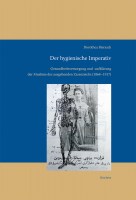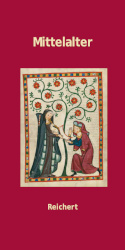Search
Der hygienische Imperativ
Gesundheitsversorgung und -aufklärung der Muslime des ausgehenden Zarenreichs (1864-1917)
2017
17.0 x 24.0 cm, 280 p., 17 illustrations b/w, hardback
ISBN: 9783954902941
17.0 x 24.0 cm, 280 p., 17 illustrations b/w, hardback
98,00 €
ISBN: 9783954902941
Short Description
The attempt to establish a health system on the basis of modern European scientific medical standards meant a great adaptation challenge for the traditional people in the Russian Empire. Particularly for the Muslim minority the pressure to adapt to the new regulations increased the risk of losing their own cultural identity and can be understood as another manifestation of mission civilisatrice. Thus the study analyzes the adaptation of the Muslim population to the so-called medicalization in the governorates of Kazan’ and Ufa. Instead of carrying on the agens - patiens dichotomy of prevailing medicalization and colonial theories, the focus is on the Muslim perception of the new medical culture and on its creative use for their own benefit.The first part of of the study outlines the development of the public health system in the region and examines the demand for the offered medical services. Contrary to what the complaints of the physicians suggest, Muslims were in fact not unwilling in general to consult them, but circumstances, such as language barriers, vast distances, and reciprocal distrust, restrained their access to medical help.
The second part analyzes Muslim media, such as health manuals and journals. It is noticeable that they contain a lot of information about excess nutrition, alcohol abuse, and neurasthenia, whereas nearly no information is given about scurvy, a widespread disease among the Tatar and Bashkir population those days. Apparently the authors were mainly influenced by Western discourses and rather unaware of the problems of their own people. Nonetheless, the divergent voices from progressive women to conservative theologians were all unified in the common goal of teaching the Muslim population to keep themselves healthy in accordance with modern health rules. Instead of playing sciences and Islamic laws off against each other, most of the writers combined them and thereby formed a scientific-religious alliance which contrasted the islamophobia of public health institutions. The study proves how this alliance helped to enhance a positive modern Islamic self-awareness by finding Islamic solutions for health problems of modern societies.
Description
The attempt to establish a health system on the basis of modern European scientific medical standards meant a great adaptation challenge for the traditional people in the Russian Empire. Particularly for the Muslim minority the pressure to adapt to the new regulations increased the risk of losing their own cultural identity and can be understood as another manifestation of mission civilisatrice. Thus the study analyzes the adaptation of the Muslim population to the so-called medicalization in the governorates of Kazan’ and Ufa. Instead of carrying on the agens - patiens dichotomy of prevailing medicalization and colonial theories, the focus is on the Muslim perception of the new medical culture and on its creative use for their own benefit.The first part of of the study outlines the development of the public health system in the region and examines the demand for the offered medical services. Contrary to what the complaints of the physicians suggest, Muslims were in fact not unwilling in general to consult them, but circumstances, such as language barriers, vast distances, and reciprocal distrust, restrained their access to medical help.
The second part analyzes Muslim media, such as health manuals and journals. It is noticeable that they contain a lot of information about excess nutrition, alcohol abuse, and neurasthenia, whereas nearly no information is given about scurvy, a widespread disease among the Tatar and Bashkir population those days. Apparently the authors were mainly influenced by Western discourses and rather unaware of the problems of their own people. Nonetheless, the divergent voices from progressive women to conservative theologians were all unified in the common goal of teaching the Muslim population to keep themselves healthy in accordance with modern health rules. Instead of playing sciences and Islamic laws off against each other, most of the writers combined them and thereby formed a scientific-religious alliance which contrasted the islamophobia of public health institutions. The study proves how this alliance helped to enhance a positive modern Islamic self-awareness by finding Islamic solutions for health problems of modern societies.




 Preface
Preface

 Neuerscheinungen 2023/2024
Neuerscheinungen 2023/2024
 Gesamtverzeichnis 2023/2024
Gesamtverzeichnis 2023/2024
 Katalog Oriental Studies & Linguistics
Katalog Oriental Studies & Linguistics
 Mittelalter
Mittelalter
 Deutsche Inschriften
Deutsche Inschriften
 Musiktherapie
Musiktherapie
 Literaturen im Kontext
Literaturen im Kontext